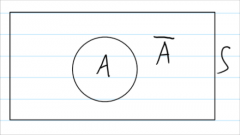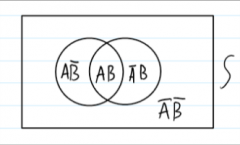![]()
![]()
![]()
Use LEFT and RIGHT arrow keys to navigate between flashcards;
Use UP and DOWN arrow keys to flip the card;
H to show hint;
A reads text to speech;
13 Cards in this Set
- Front
- Back
- 3rd side (hint)
|
What is probability?
|
![It is a random set function that maps classes of events to real numbers in the interval [0,1]](https://images.cram.com/images/upload-flashcards/65/98/40/21659840_m.png)
It is a random set function that maps classes of events to real numbers in the interval [0,1] |
|
|
|
What is a sample set (S)?
|
The set of all possible outcomes
|
|
|
|
What is an event?
|
Any collection of outcomes contained in the sample set S
|
|
|
|
What are the four axioms of probability?
|
1) 0 ≤ P(A) ≤ 1 for any A in (fancy A) 2) P(S) = 1 3) P(~A) = 1-P(A) where ~A is the complement of event A 4) If A1 and A2 are disjoint (non-overlapping) then P(A1 or A2) = P(A1 ∪ A2) = P(at least one of them) = P(A1)+P(A2) |
|
|
|
Additivity Property: If A1, A2,···,An is an infinite collection of disjoint events then..
|
P(A1 ∪ A2 ∪ ···) = ∑ P(Ai)
|
|
|
|
Prove: P(Ā) = 1-P(A)
|
A∪Ā = S => P(A∪Ā) = P(S) => P(A) + P(Ā) = 1 => P(Ā) = 1 - P(A) |

A∩Ā = AĀ = ∅ A∪Ā = S |
|
|
What is the general formula for conditional probability represented by P(A|B)
|
P(A|B) = P(A∩B) / P(B)
|
|
|
|
What is the Multiplication Rule of Probability?
|
P(A∩B) = P(A)P(B|A) P(A∩B∩C) = P(A)P(B|A)P(C|A∩B) P(A∩B∩C∩D) = P(A)P(B|A)P(C|A∩B)P(D|A∩B∩C) |
|
|
|
What is DeMorgan's Law
|
~(A1∪A2) = ~A1∩~A2 ~(A1∩A2) = ~A1∪~A2 |
|
|
|
If A and Bare independent then.. - P(A|B) = ? - P(B|A) = ? - P(A∩B) = ? |
- P(A|B) = P(A) - P(B|A) = P(B) - P(A∩B) = P(A)P(B) |
Conditional probability does not apply under independence
|
|
|
What is P(A∩~B)?
|
P(A) - P(A∩B)
|

|
|
|
What is the general formula for discrete binomial distribution?
|
(nCp)p^x(1-p)^n-x
|
|
|
|
What is the general formula for poisson distribution
|
(e^-λ)(λ^x)/x!
|
|

